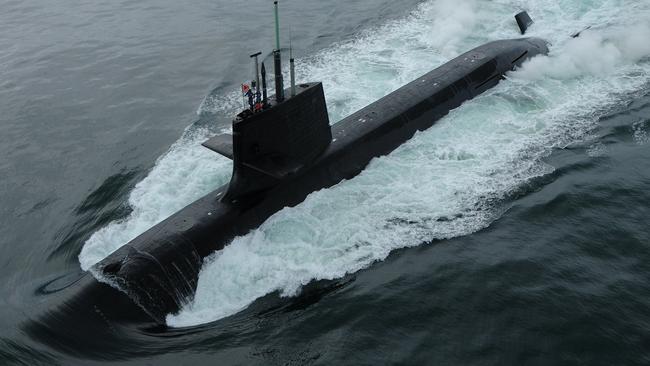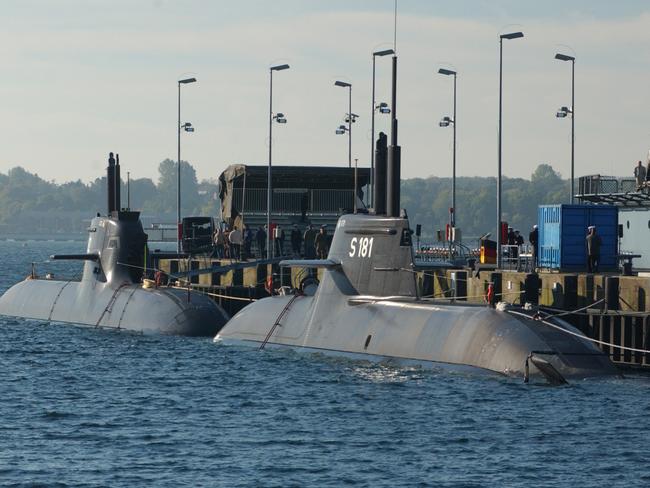Chinese spies try to hack Future Generation submarine bidders’ plans
CHINESE spies are trying to hack top-secret information from the three countries vying for Australia’s lucrative Future Submarines project, sources close to the bids say.
- Germans want to export subs made in Australia
- Get your first look inside Soryu sub
- The Next Generation: The blueprint for our new subs
- French shipbuilders pledge 2000 jobs in Adelaide with subs tender
CHINESE spies are trying to hack top-secret information from the three countries vying for Australia’s lucrative Future Submarines project, sources close to the bids say.
The Advertiser has visited all three bidders for the $50 billion project — France, Germany and Japan — and learned that they have all been targeted by hackers.
A Japanese Government official told The Advertiser that China was responsible for cyber attacks on their classified information about the submarine they want to build for Australia, while German shipbuilders TKMS said they were fending off up to 40 hacking attempts a day.
It is understood that France is also fending off hacking attempts from China.
And the spying attempts are not limited to China — companies and governments from multiple countries are understood to be engaged in the espionage.
Hi-tech solutions such as encryption and low-tech precautions, such as physically transporting information instead of sending it over the internet, have kept Australian information safe, but those involved in the project are far from complacent.

Russia has reportedly increased its spy operations against Australia in recent months, and is understood to be among the countries that want to gain access to valuable defence information.
Cyber security is a top priority for both the shipbuilders and the Australian Government and is being discussed throughout the competitive evaluation process.
TKMS Australia director Jim Duncan said the Australian Government had raised the issue and viewed it as “significant”.
He said that undertaking the entire project in Australia would help protect top-secret information.
“One of the reasons we think the all-Australian build. is a good option is because you’re taking care of those security issues once and once only,” he said.
TKMS wants to build all eight submarines in Australia but is also prepared to build offshore or hybrid option, if that’s what the Government wants.

Campaign Manager Manfred Klein said the company’s Kiel shipyard was the target of hacking attempts.
“We have about 30 to 40 attempts per night. That’s what our IT people say,” he said.
His colleague on the campaign, Robert Budell, said it was a “fact of life”.
“We have to be careful of it, with a secure defence facility, and we have to take proper precautions. There are definitely things that we don’t put in emails,” he said.
“If you don’t want something to get out, you shouldn’t put it in electronic form.”
French shipbuilders DCNS also take every precaution to stop spies from accessing classified information.
“All communication between France and Australia is handled in a perfectly certified security system,” DCNS Australia chief executive Sean Costello said.
Japanese officials said China was a particular concern as tensions mount over the South China Sea.
However, other countries including Russia are believed to be involved.
Australia and Russia have had belligerent stand-offs in recent times, including former Prime Minister Tony Abbott threatening to “shirt-front” President Vladimir Putin, and Mr Putin sent warships to hover in international waters near Australia last year.
Former ASIO chief David Irvine has said terrorists including ISIS are intensifying their cyber attacks.
“We can also anticipate that the political tensions throughout the region can be played out online as cyberspace becomes increasingly another medium for international competition and national interests,” he said.
The Government is in the process of beefing up the Australian Cyber Security Centre, and funds additional protection through the national computer emergency response team.
In its latest annual report, the Australian Security Intelligence Agency warned there was extensive espionage and “clandestine foreign interference activity” against Australia.
“As international tensions increase, the stakes tend to become higher,” the report states.
“ASIO continues to allocate substantial resources to defensive outreach and advice to heighten awareness of the threat environment and to drive appropriate security policy responses.”
The US defence chief Ashton Carter yesterday warned about both Russian aggression and the potential for conflict in the Asian region.
He said he was worried about “the prospect of further militarisation, as well as the potential for these activities to increase the risk of miscalculation or conflict among claimant states”.
